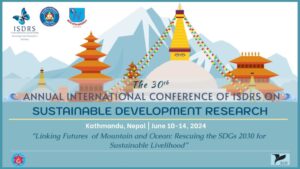Goals/Objectives and Areas
One way to reach the UN Sustainable Development Goals (SDGs) is to follow One Health approaches. Primarily focusing on diseases transmitted between humans and animals, the scope has widened to include other health-related issues with more than one species. Additional scientific disciplines have become involved, including arts and humanities. One Health approaches have a strong multispecies and multi- or interdisciplinary scope, both scientifically and societally. This primarily deals with health and well-being (SDG3) but also with all the other goals, because health in its broadest sense is dependent on all aspects of life. Much emphasis in research has been put on medical, biological and veterinary aspects of One Health approaches, and very little on ethical aspects. Are there conflicts between different SDGs so that a progress in one risks influencing another negatively? If humans, animals, plants and ecosystems all count, what ethical framework could be used to think about fulfilling the SDGs? What happens to human rights in a multispecies community? What are the future ethical obstacles in global health policies if they are to consider more species than just humans?
This track will discuss these issues with the aim to propose a declaration indicating areas worth considering in future research and policy making regarding ethics in relation to the SDGs. This final declaration will be based on knowledge brought forward through the track.
Length And Content Of The Proposed Abstract To The Track
Each proposed abstract (in connection to an area pointed out above) of between 300 and 500 words (including all aspects),
- shall be best organized (without headlines) along usual structure: introduction, methods, findings or results, and discussion/conclusions.
- does not need but can include references.
- shall provide a final section indicating
- how the proposed abstract relates to the sustainable development goals SDGs and SDG-targets (e.g. “SDG +Target: 14.1.”).
- a brief indication how the proposed contribution relates to the topic of the Conference (Linking Futures of Mountain and Ocean: Rescuing the SDGs 2030 for Sustainable Livelihood)
Potential Publication Channels
With regard to potential publications, depending on the number and quality of contributions, several publication opportunities have been envisaged.
Submission
Keep up to date with developments of ISDRS 2024 Tracks here
“Linking Futures of Mountain and Ocean: Rescuing the SDGs 2030 for Sustainable Livelihood“
Who are we?
Noor Hazfalinda Hamzah, Faculty of Health Sciences, Universiti Kebangsaan Malaysia.
Nigel Holt, Head of Psychology, Aberystwyth University.
Sujan Babu Marahatta, Nepal Open University, Nepal.
sujan@nou.edu.np
Om Kurmi, Center for Healthcare and Communities, Coventry University, UK.
omkurmi@googlemail.com
